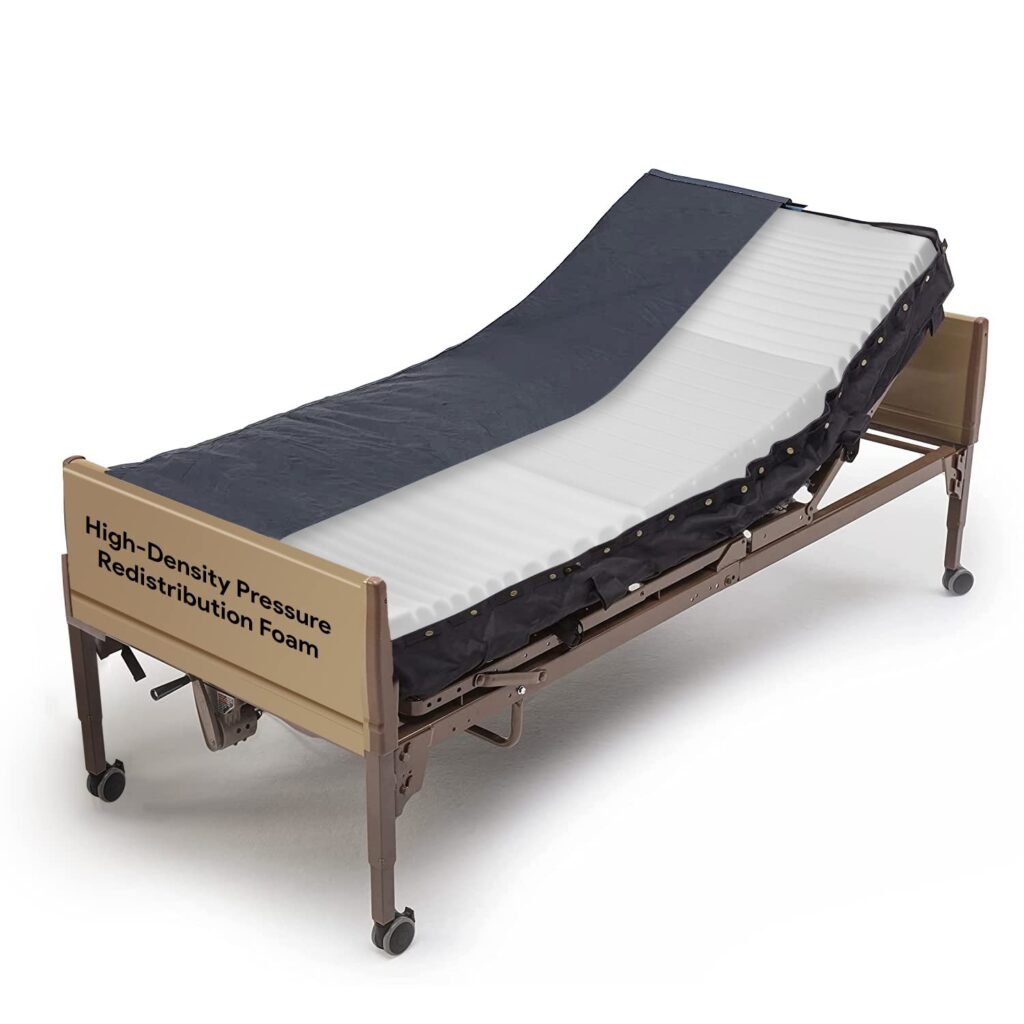Are you wondering what size mattress is used in a hospital bed? If so, you’re not alone. Many people are curious to know the answer to this question, as they may be considering purchasing a hospital bed for home use or they may be trying to figure out the best mattress size for a hospital bed. In this article, we’ll answer your questions about what size mattress is used in a hospital bed and provide you with some helpful tips for choosing the right mattress for your needs.
Standard Hospital Bed Mattresses
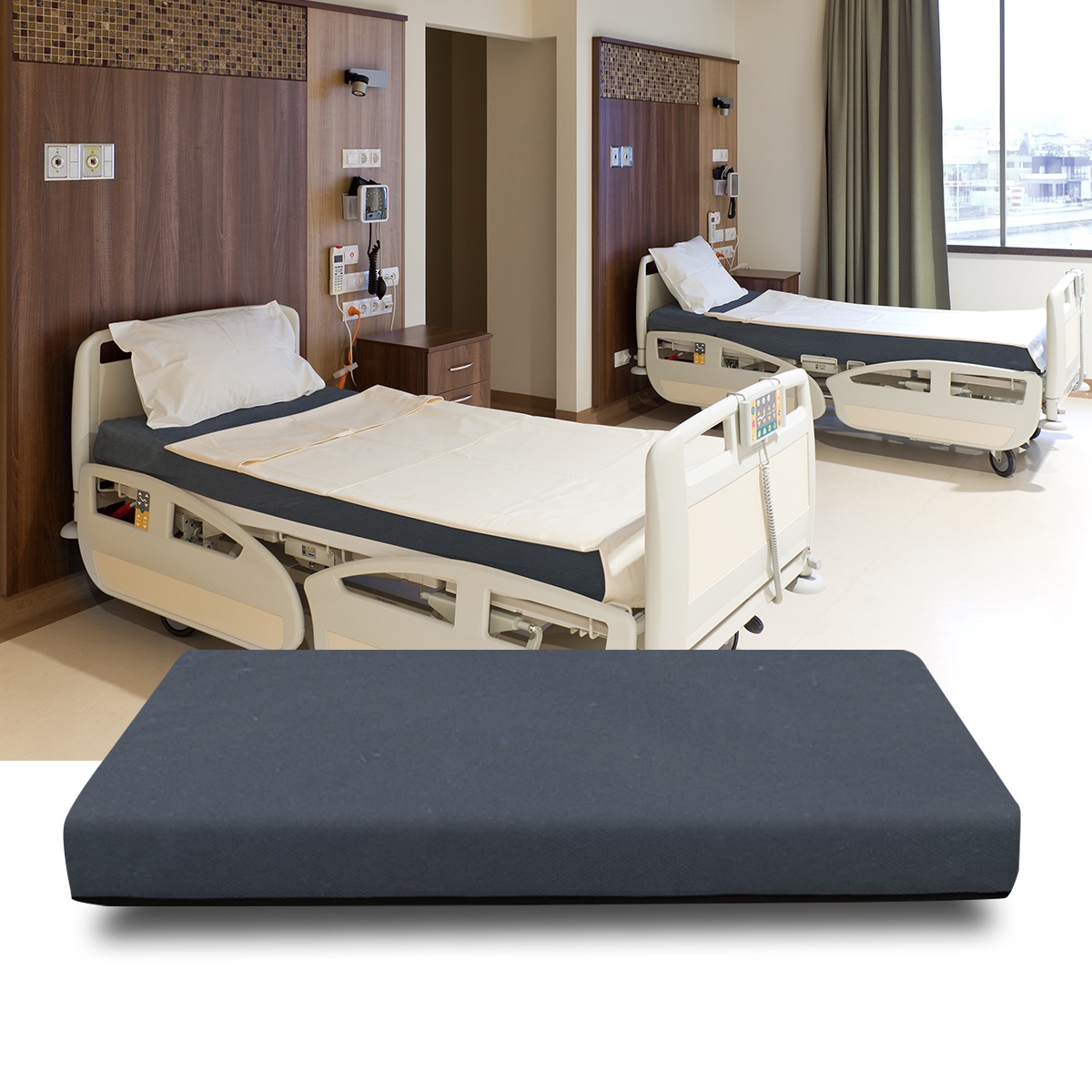
Standard hospital bed mattresses are typically 36” x 80” x 6”, the same size as a traditional twin bed mattress. The mattresses come in two different styles – innerspring and foam. Innerspring mattresses are made of metal coils and usually have a quilted top. Foam mattresses are made of high-density foam and are usually more comfortable than innerspring mattresses. The mattress should fit snugly in the hospital bed frame and be properly secured with straps. The mattress should also be cleaned and sanitized regularly to prevent the spread of bacteria.
Dimensions of Hospital Bed Mattresses
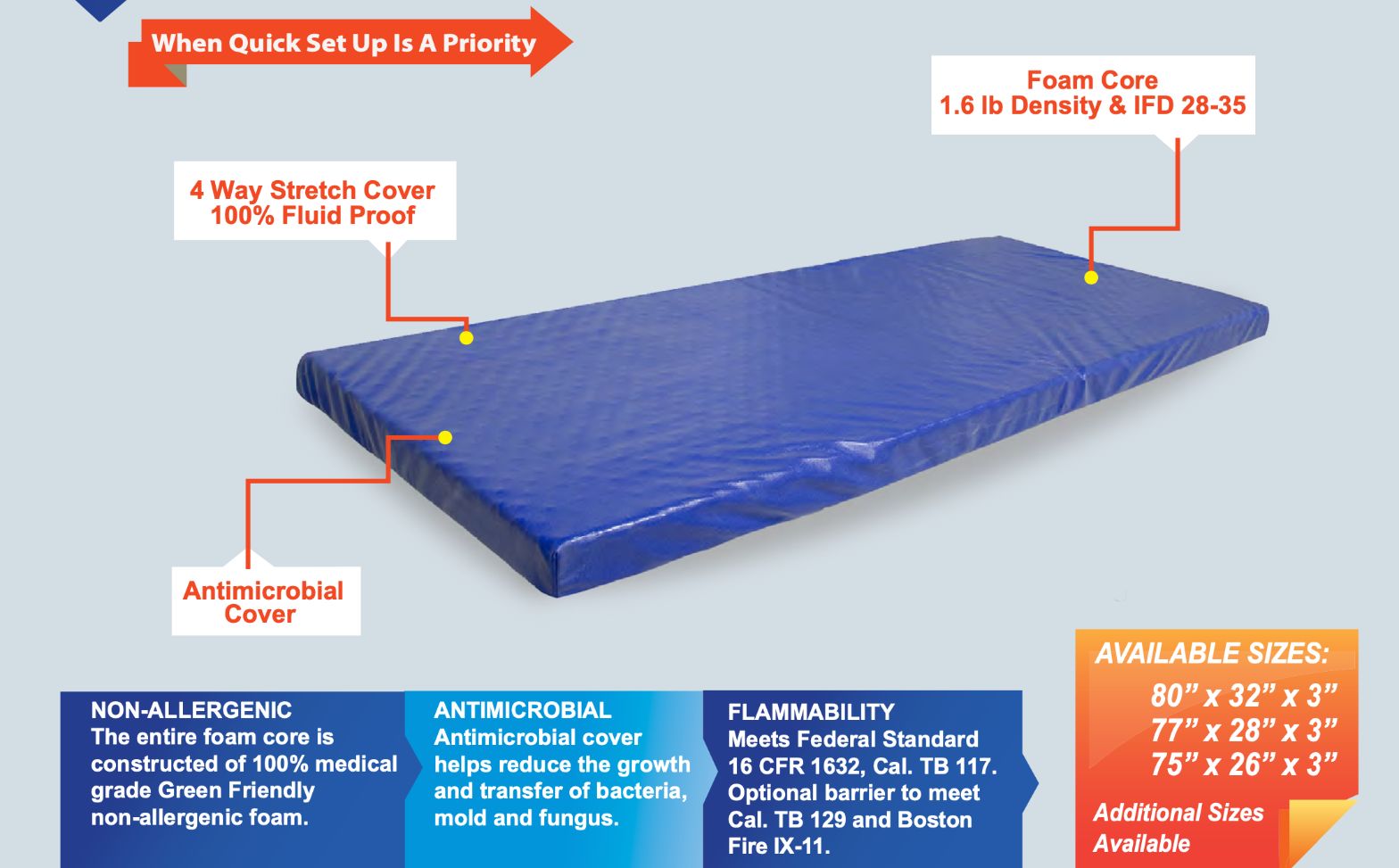
Hospital bed mattresses come in different sizes, depending on the type of bed and the patient’s needs. Standard hospital beds are typically 36″ wide and 80″ long. Bariatric beds can be up to 48″ wide and 84″ long. Low-profile and ultra-low beds are usually 36″ wide and 74″ long.
Standard hospital beds are also available in a variety of thicknesses, ranging from 5″ to 8″ thick. Bariatric beds are usually 6″ to 8″ thick, while low-profile and ultra-low beds are usually 5″ to 6″ thick.
When selecting a mattress for a hospital bed, it is important to consider the patient’s weight and size as well as their medical condition. The mattress should be thick enough to provide a comfortable and supportive sleeping surface but not so thick that it impairs the bed’s ability to move up and down.
It is also important to ensure that the mattress is made of a durable material that is easy to clean and maintain. The mattress should be fire-resistant and able to withstand frequent cleaning and disinfecting.
When purchasing a mattress for a hospital bed, it is important to ensure that the size is compatible with the bed frame. It is also important to make sure that the mattress is certified by an independent testing organization such as UL or ASTM. This will ensure that it meets the highest safety standards.
Types of Mattresses Used in Hospital Beds
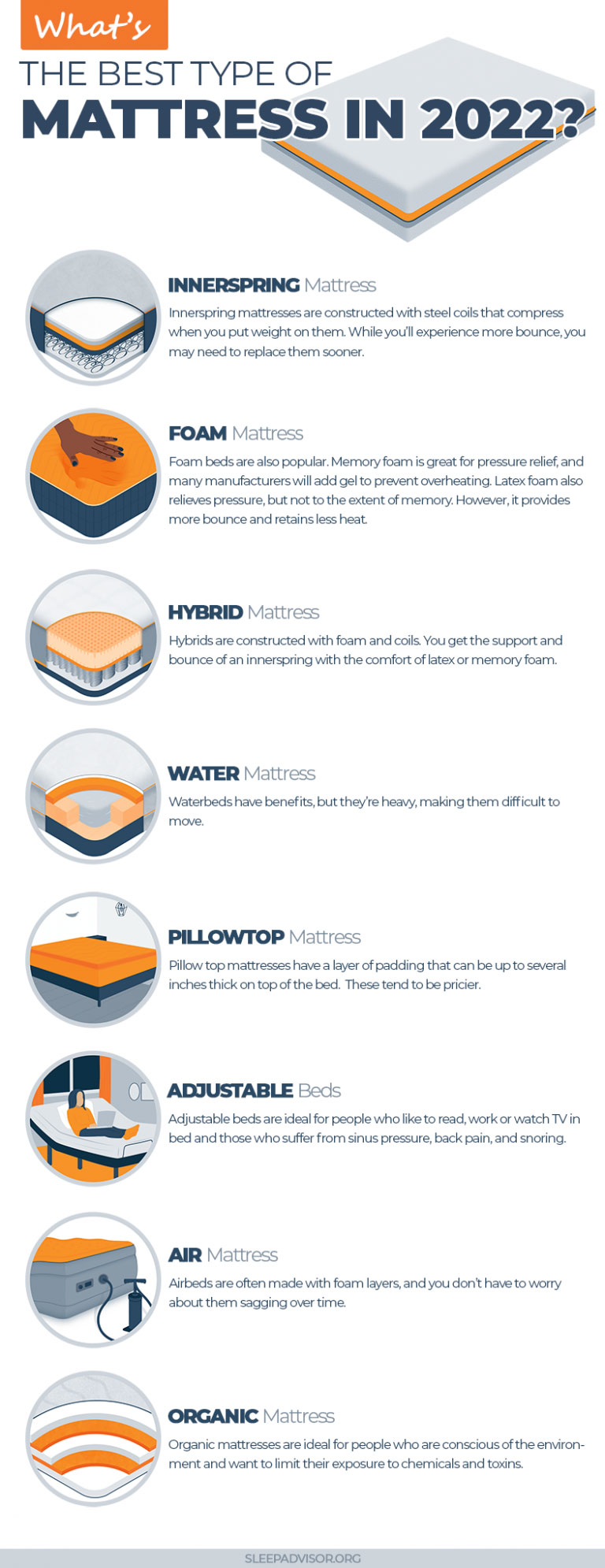
Hospital beds are designed with comfort and safety in mind, so the mattresses used in them must meet certain criteria. The type of mattress used in a hospital bed is typically determined by the bed’s purpose and the patient’s specific needs. Generally, the three types of mattresses used in hospital beds are innerspring mattresses, foam mattresses, and air mattresses.
Innerspring Mattresses are the most common type of mattress used in hospital beds. They are made up of a steel coil support system and padding materials such as cotton, wool, and foam. Innerspring mattresses are typically adjustable and provide support and comfort for the patient.
Foam Mattresses are usually composed of several layers of foam, including memory foam, which is designed to conform to the body’s shape. Foam mattresses are generally more durable than innerspring mattresses and provide more pressure relief.
Air Mattresses are designed with air-filled chambers that can be adjusted to the patient’s comfort level. They are often used for patients who need to be kept off of their beds for long periods of time, as the air chambers help to reduce the risk of developing pressure sores.
Benefits of Specialized Hospital Bed Mattresses
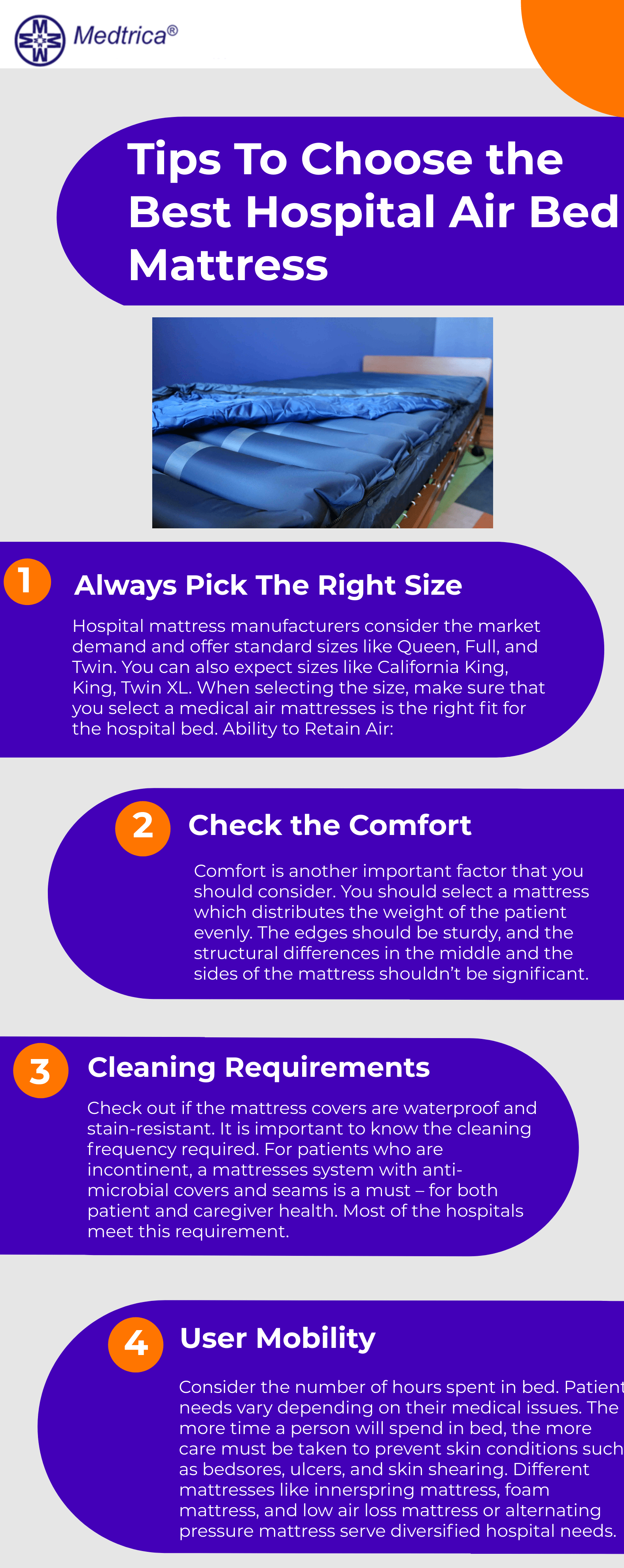
- Comfort: Specialized hospital bed mattresses are designed to provide superior comfort, cushioning, and support for patients who are bedridden or in need of extended bed rest.
- Pressure Relief: Specialized hospital bed mattresses are designed to help reduce pressure sores and other medical complications by providing pressure relief and improved circulation.
- Durability: Specialized hospital bed mattresses are built to last, with high-quality materials that can withstand daily use and support patients who have limited mobility.
- Safety: Specialized hospital bed mattresses are designed to ensure patient safety, with features such as anti-slip and anti-tear construction.
- Infection Control: Specialized hospital bed mattresses are designed to reduce the risk of cross-contamination and the spread of germs and bacteria.
Considerations When Choosing a Hospital Bed Mattress
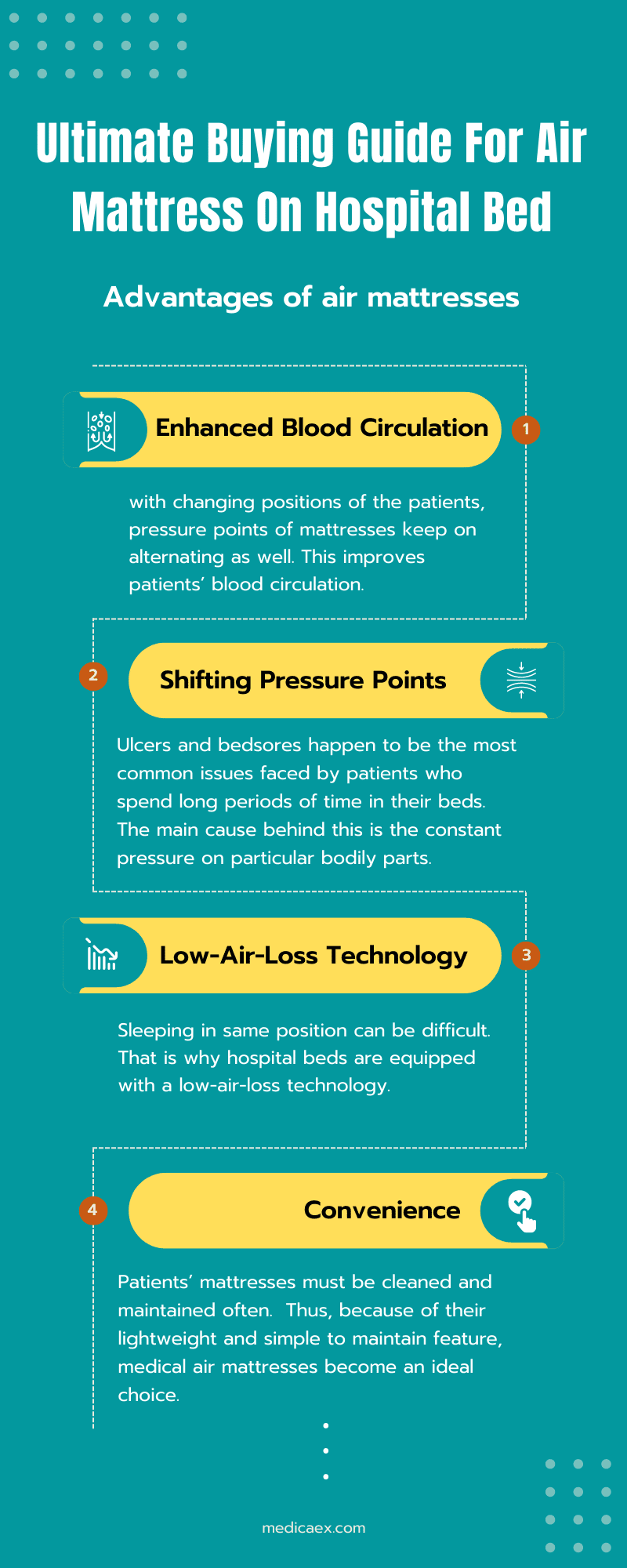
- Durability: Hospital bed mattresses are designed to provide comfort and support for long periods of time, so they must be durable and made from high-quality materials.
- Weight Capacity: Most hospital bed mattresses are designed to accommodate a range of patient weights, so you should choose one that is appropriate for the weight of the intended user.
- Firmness: Firmness is a key factor to consider when selecting a hospital bed mattress. The mattress should be firm enough to provide support, but not too firm to cause discomfort.
- Pressure Relief: Pressure relief is essential to ensure that the patient is comfortable and to reduce the chances of developing pressure sores. Look for a mattress that offers adequate pressure relief.
- Moisture-wicking: Moisture-wicking fabrics help keep the mattress dry and help prevent the growth of bacteria and mold. Look for a mattress that offers moisture-wicking fabrics.
- Flame Retardancy: Hospital bed mattresses must be flame retardant in order to meet safety standards. Look for a mattress that is certified flame retardant.
- Cost: Hospital bed mattresses can vary significantly in cost, depending on the features and materials. Consider your budget when choosing a mattress.
Factors Influencing Hospital Bed Mattress Price

- Size: The size of a hospital bed mattress is a key factor in determining its price. The larger the mattress, the more expensive it tends to be.
- Quality: The quality of the mattress also plays an important role in the price. Higher quality mattresses tend to be more expensive than lower quality ones.
- Material: The material used to make a mattress also affects its price. Mattresses made from higher quality materials such as memory foam tend to cost more than those made from lower quality materials such as polyester.
- Brand: The brand of a hospital bed mattress can also affect its price. Mattresses from well-known brands tend to be more expensive than those from lesser-known brands.
Where to Buy Hospital Bed Mattresses
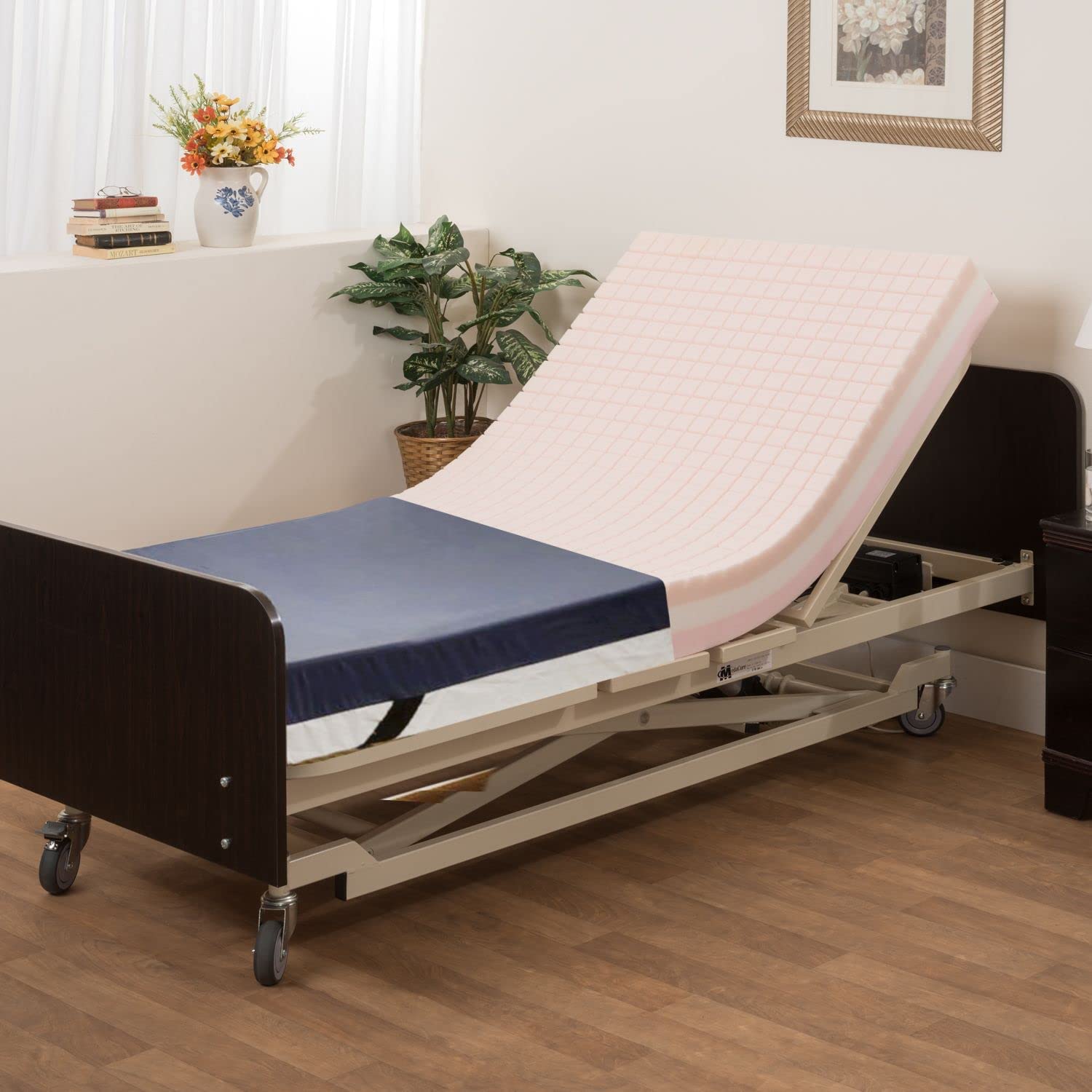
Finding a hospital bed mattress that fits your needs and budget can be tricky. Here are a few tips to help you find the right mattress:
- Check with your local medical supply store: Many medical supply stores sell hospital bed mattresses, and can help you find the right size and type for your needs.
- Shop online: Many online retailers offer a wide selection of hospital bed mattresses at competitive prices. Be sure to read customer reviews to ensure you are purchasing a mattress that is of good quality.
- Ask your hospital: Your local hospital may be able to provide you with a hospital bed mattress or direct you to a store that sells them.
When shopping for a hospital bed mattress, it is important to make sure you get the right size. Measure the bed before buying a mattress, and make sure it is the correct size for the bed. Buying a mattress that is too large or too small can be dangerous and may not be comfortable.
Maintenance and Care of Hospital Bed Mattresses
Hospital bed mattresses are designed to provide a safe, comfortable sleeping experience for patients. To ensure the mattress is kept in peak condition, the following maintenance and care steps should be taken:
Cleaning: Hospital bed mattresses should be cleaned with a mild detergent and warm water. Be sure to avoid using any harsh chemicals. It is also important to allow the mattress to completely dry before putting it back on the bed.
Inspection: Inspecting the mattress for tears, stains, and other signs of wear and tear is an important step in maintaining a hospital bed mattress. If any issues are found, the mattress should be replaced immediately.
Storage: When not in use, the mattress should be stored in a dry, cool area. This will help prevent mold and mildew from forming.
By taking the necessary precautions and following these maintenance and care steps, hospitals can ensure that the size of their hospital bed mattresses is always optimal for providing patients with a safe and comfortable sleeping experience.
Frequently Asked Questions
What are the Benefits of Using a Hospital Bed Mattress?
- Comfort: Hospital beds are designed to provide comfort that is tailored to individual needs and preferences. The mattresses are designed to be adjustable, so they can be adjusted to fit the contours of the patient’s body and provide maximum support.
- Safety: Hospital bed mattresses are designed with safety in mind. The mattresses are designed to reduce the risk of pressure sores and other medical complications. They are also designed to be fire-resistant and to provide adequate support for patients who may be at risk of falls or other serious injuries.
- Durability: Hospital bed mattresses are designed to be durable and can last for many years. They are made from materials that are designed to resist wear and tear and to provide maximum comfort and support.
- Hygiene: Hospital bed mattresses are designed to be hygienic and to reduce the risk of infections. They are made from materials that are designed to be easy to clean and to resist the growth of bacteria, mold, and mildew.
- Pressure Relief: Hospital bed mattresses are designed to provide pressure relief for those who suffer from chronic pain or pressure sores. The mattresses are designed to reduce pressure points and to provide adequate support.
What other types of mattresses are suitable for use in a hospital bed?
Air Mattress: An air mattress, or airoverlay, is designed to provide superior comfort and support while preventing the development of pressure ulcers. It features adjustable air cells that can be adjusted to the patient’s body shape and weight, providing pressure relief and support.
Innerspring Mattress: Innerspring mattresses are designed to offer superior support and pressure relief. They are usually composed of a combination of foam and springs, and often feature a foam top layer for extra comfort.
Foam Mattress: Foam mattresses are designed to provide superior comfort and pressure relief while preventing the development of pressure ulcers. They are constructed from high-density foam that is designed to mold to the patient’s body shape and weight.
Gel Mattress: Gel mattresses are designed to provide superior comfort and pressure relief while preventing the development of pressure ulcers. They are constructed from a combination of gel and foam that is designed to provide superior support and comfort.
Latex Mattress: Latex mattresses are designed to provide superior comfort and pressure relief while preventing the development of pressure ulcers. They are constructed from a combination of latex and foam that is designed to provide superior support and comfort.
Are There Any Special Features that Hospital Bed Mattresses Have?
Hospital bed mattresses have many features that make them ideal for hospital use. Here are some of the more prominent features:
- Pressure Relief – Hospital bed mattresses are designed to reduce the pressure on skin and joints by distributing pressure evenly across the surface. This reduces the risk of skin breakdown and improves patient comfort.
- Fluid Resistance – Hospital bed mattresses are designed to be water-resistant and to repel fluids. This is important to reduce the risk of infection and ensure a clean, hygienic sleeping environment.
- Air Flow – Hospital bed mattresses are designed to allow air to flow through the mattress, so that the patient’s body temperature remains regulated and comfortable.
- Weight Capacity – Hospital bed mattresses are designed to support heavier individuals, as well as those with limited mobility. This ensures that the patient is comfortable and safe.
- Anti-Microbial Coating – Hospital bed mattresses are often coated with an anti-microbial material to reduce the risk of infection and keep the mattress clean.
These features make hospital bed mattresses the ideal choice for hospital use.
Are hospital bed mattresses adjustable?
Yes, hospital bed mattresses are adjustable. Most hospital beds have a built-in mechanism that allows them to be raised and lowered at different angles. This allows the patient to find a comfortable position while they are in bed. Additionally, the mattress can be adjusted to provide the correct amount of support for the patient’s body.
Is there a difference between a hospital bed mattress and a regular mattress?
Yes, there is a significant difference between a hospital bed mattress and a regular mattress. Hospital bed mattresses are specifically designed and manufactured to provide superior comfort and support for patients who are confined to a bed for long periods of time. The following are some of the key differences between a hospital bed mattress and a regular mattress:
- Material: Hospital bed mattresses are made from high-quality materials that are designed to provide maximum comfort and support. Regular mattresses are usually made from lower-grade materials and lack the same level of comfort and support.
- Firmness: Hospital bed mattresses are typically softer than regular mattresses and are designed to relieve pressure on the body. They are also designed to reduce the risk of bedsores and other medical conditions that can arise from long-term bed confinement.
- Durability: Hospital bed mattresses are designed to withstand long-term use and are made from materials that are resistant to moisture, bacteria, and other contaminants.
- Size: Hospital bed mattresses are typically larger than standard mattresses and are specifically designed to fit the dimensions of a hospital bed.
Hospital bed mattresses are an important part of providing comfort and support for patients who are confined to a bed for long periods of time. They are designed to provide superior comfort and support and are made from materials that are designed to last.
Conclusion
The size mattress used in a hospital bed can vary depending on the type of bed and the size of the patient. Generally, a standard hospital bed uses a 36” x 80” mattress, while bariatric beds use a 42” x 80” mattress. It is important to measure the bed before purchasing a mattress to ensure the correct size is purchased.
